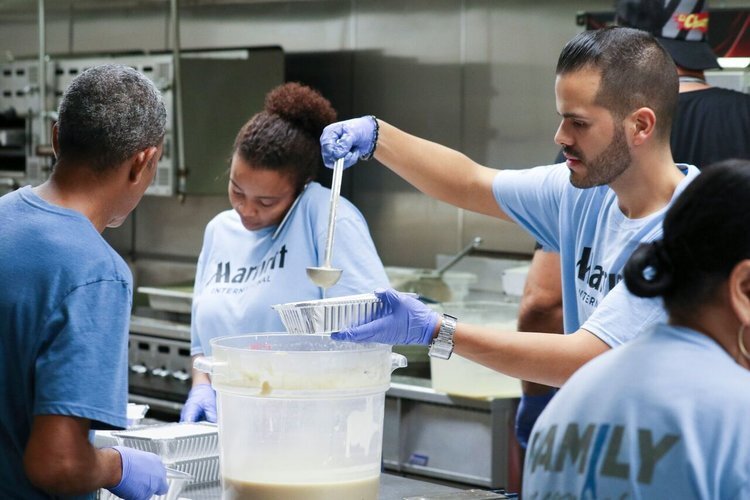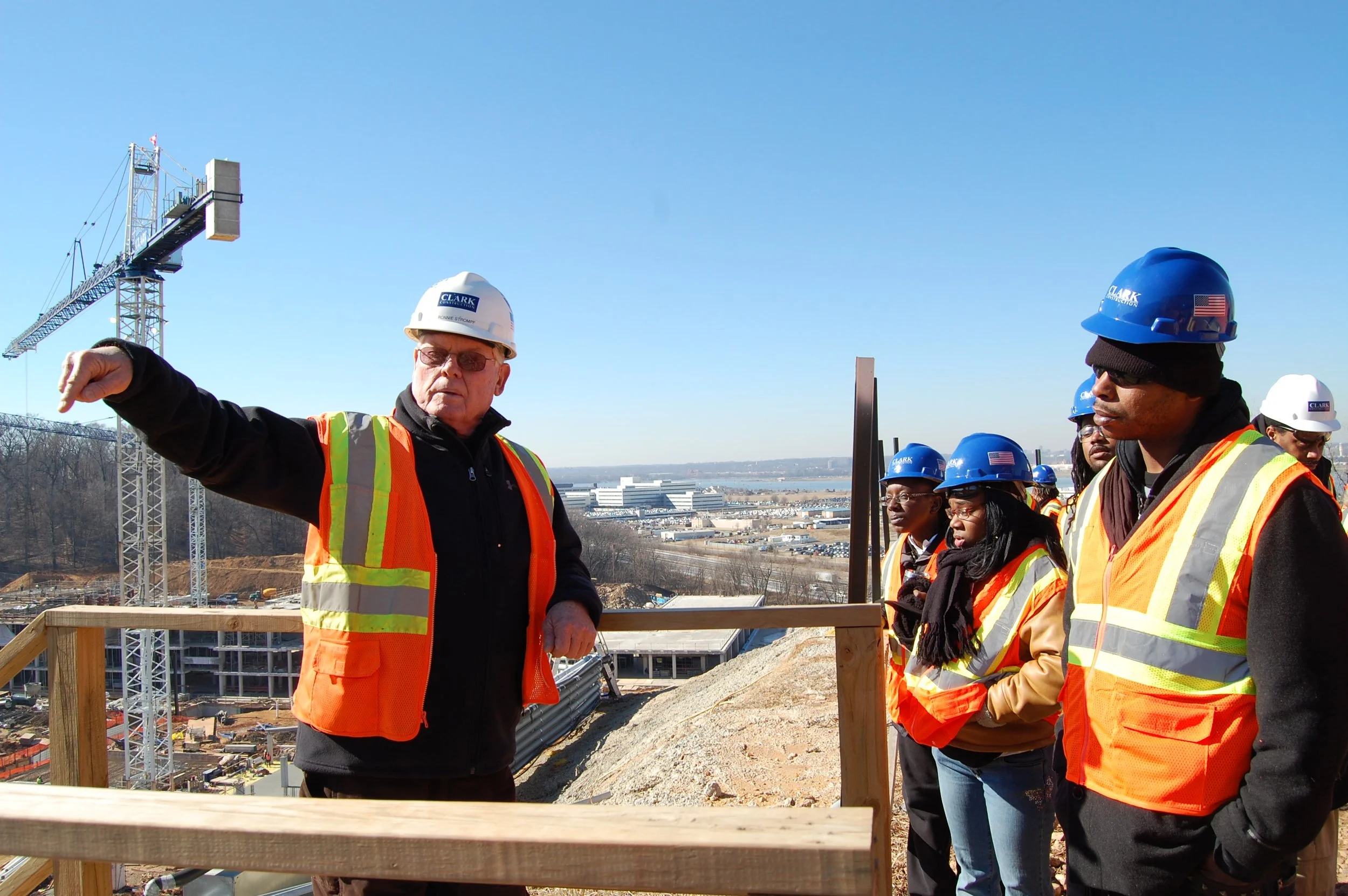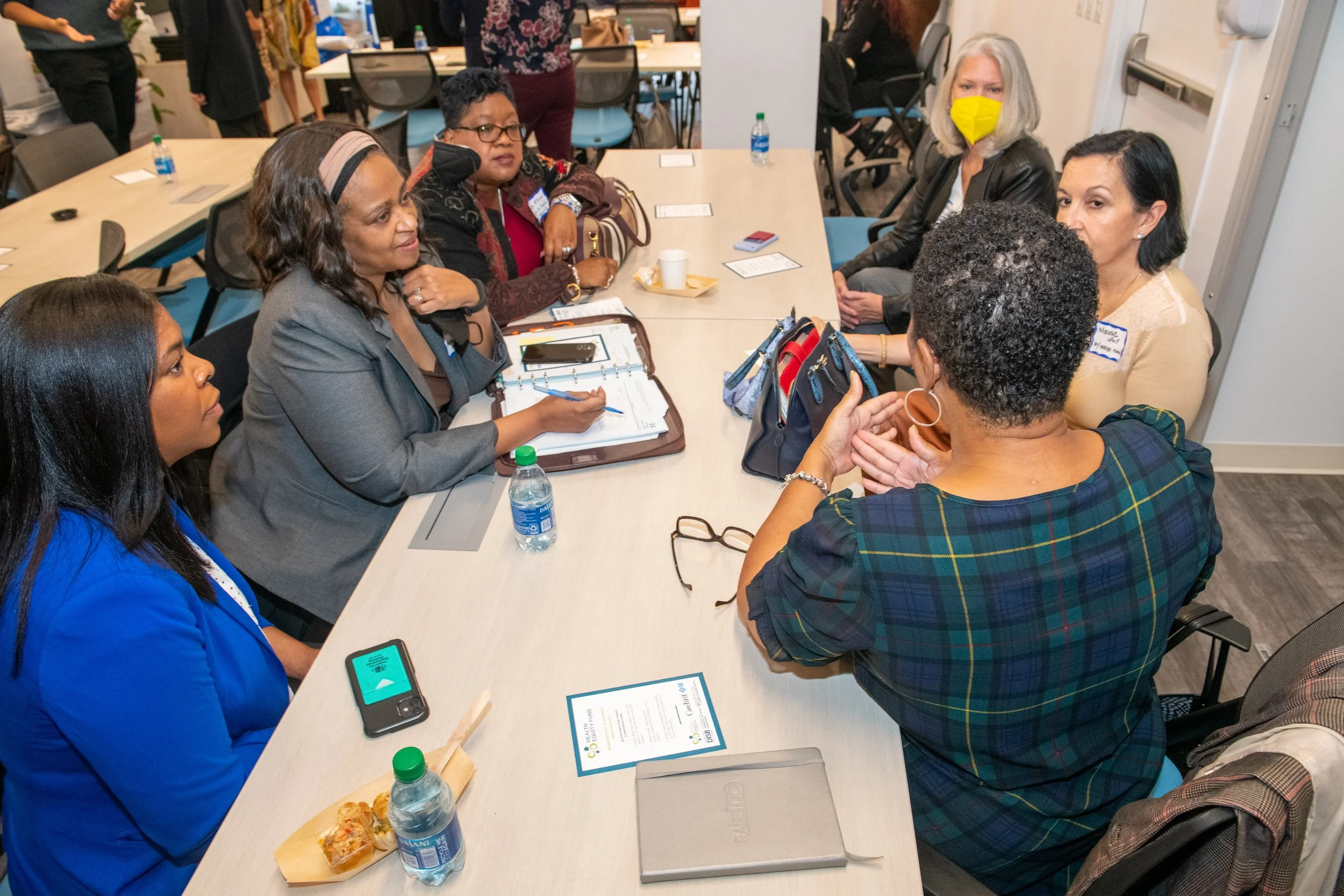
Making History.
Amidst the backdrop of political and social changes brought on by the civil rights movement, the District Home Rule Act was signed into law in 1973, bestowing limited self-governing powers on the Black majority city for the first time in over a century.

Around that same time, a group of prominent business and civic leaders were compelled to establish a local community foundation to “promote a permanent source of philanthropic capital for the Washington Metropolitan region.” Many of our original founders and supporters were part of the Civil Rights movement both locally and nationally.
Trustee Peggy Cooper Cafritz co-founded what would become the Duke Ellington School of the Arts.
What these visionary leaders started as a small public charity with broad charitable interests has grown to become the largest local funder with a lasting impact on our region. Over time our focus has evolved to meet urgent and emerging needs facing our community -- from our earliest grants for economic development projects targeting Marshall Heights, the H Street corridor, and Shaw to our work today to increase economic mobility and help close the racial wealth gap across the Greater Washington region.
Trustee Maceo W. Hubbard was one of the first African Americans to graduate from Harvard Law School in 1926; he helped develop policies and legislation related to school desegregation that became part of the Civil Rights Act of 1964.
Our First 50 Years
1979 - Our First Grants
The Community Foundation began to invest in local nonprofit organizations with our first grants, totaling $115,641.
1982 - The Summit Fund
Vicki and Roger Sant, established the Summit Fund as a donor-advised fund at The Community Foundation. A decade later, the fund expanded to become our first sponsoring organization, with a focus on restoring and protecting the Anacostia River and preventing teen pregnancy.
1981 - Early Investments in Community Development
Our support for the Local Initiatives Support Corporation (LISC), a program providing grants and loans for economic development projects sponsored by Washington-area community-based organizations, targeted the neighborhoods of Marshall Heights, the H Street corridor, and Shaw.
1983 - Emergency Loan Fund
Created to provide short-term, low-interest loans to Washington-area nonprofits experiencing temporary cash flow problems.
1985 - Healthcare for the Homeless
Started in 1985, the project operated health stations in shelters and mobile outreach units, conducting over 19,000 patient visits to provide primary care, mental health assessments, and social services.
1986 - Washington Fund for the Prevention of Substance Abuse
A partnership with the Federal City Council, the Greater Washington Research Center, and the Metropolitan Washington Board of Trade that commissioned a 15-month assessment, released in 1988, which led to the formation of the Corporation Against Drug Abuse.
1986 - Early Investments in LGBTQ+ Community
We spearheaded the Washington Metropolitan Business Leadership Task Force on AIDS with a focus on the growing spread of HIV/AIDS in the region. A decade later, we launched the Bridge Builders Fund, a giving circle supporting projects that fostered connections between the region’s LGBTQ+ and other communities.
1987 - Action to Rehabilitate Community Housing (ARCH)
We played a leadership role in ARCH, a partnership with Pepco, to provide job training for unemployed or underemployed residents in construction and building rehabilitation.
1989 - Barbara Bush Foundation for Family Literacy
A component fund that over two decades awarded $31 million to more than 700 family literacy programs in all 50 states and DC. Continuing that tradition, the Laura Bush Foundation for America’s Libraries was also a component fund that helped school libraries modernize and diversify their collections.
1991 - Help the Homeless Fund and Walkathon
A long-standing partnership with the Fannie Mae Foundation to raise awareness of homelessness – 75,000 people participated in walks held on the National Mall and in communities throughout the country – and distribute $70 million over 24 years to nonprofits providing life-sustaining services to unhoused residents.
1992 - R. Robert Linowes Named Chair of the Board of Trustees
Linowes brought in influential leaders such as Katharine Graham, Joan Maxwell, Lawrence Hough, Stewart Bainum, Vicki Sant, Michele Hagans, Diane Bernstein, and Charito Kruvant to join him in revitalizing the organization. He also hired William B. Hart to direct the organization.
1996 - Montgomery County Affiliate
With the help of founding Executive Director, Sally Rudney, and the Montgomery County Advisory Board, led by Cliff Kendall, our local office in Montgomery County has expanded our community of individual and corporate givers in the county and led to the creation of Sharing Montgomery.
1996 - Terri Lee Freeman Named First Black Female President and CEO
As our longest-serving President and CEO (from 1996 to 2014), Terri’s visionary leadership was the driving force behind critical initiatives that helped our community through major disasters, instigated groundbreaking conversations about race and racism, and mobilized resources to expand equity, access, and opportunity for all residents of the region.
1996 - LEARN Foundation
The LEARN Foundation (Landover Educational Athletic Recreational Nonprofit) was created via a community benefit agreement between Jack Kent Cooke and the Honorable Wayne K. Curry during construction of FedExField. As a component fund, it has awarded close to $1 million in scholarships to Prince George’s County students.
1997 - Sharing Community Funds
The program – first established as Sharing Montgomery, and eventually expanding to DC, Prince George’s, and Northern Virginia – continues to bring together donors to pool charitable resources into strategic grants that have helped grow phenomenal grassroots organizations so they can maximize impact in the local community.
1997 - Linowes Leadership Awards
Named in honor of the late R. Robert Linowes, a prominent attorney, civic leader, philanthropist, the awards recognized our community’s “unsung heroes”. Over nine years, 53 honorees each received a cash award of $1,000 plus an additional $1,000 for a nonprofit organization of their choice.
1998 - Our Incubation Program Starts with City First Bank
Over the years, we have helped support, launch, and nurture a range of organizations that have strengthened our community, starting with City First Bank in 1998 and including Washington Regional Association of Grantmakers (WRAG), the Nonprofit Roundtable, Venture Philanthropy Partners (VPP), Generation Hope, and Raise DC.
1998 - Washington Area Partnership for Immigrants
WAPI was a coalition of foundations, corporations, government agencies, and local immigrant groups that addressed day labor issues, education and parent involvement, legal services, and the capacity of nonprofits that serve immigrants.
1998 - Prince George’s County Affiliate
The Prince George’s Community Foundation became part of our family, with a goal to raise local philanthropic capital to address specific needs of county residents. Now known as our local office, our efforts in the county have led to the investment of more than $64 million in education, workforce development, health, and safety net services.
2001 to 2008 - Washington Creative Communities Initiative
We led a cross-sector collaborative focused on creating a strong support infrastructure for local artists by investing $800,000 to support individual artists, the majority of whom were people of color, working in partnership with nonprofits to produce and present creative projects.
2001-2008 - Survivors’ Fund
Following the 9/11 attack on the Pentagon, we led the Survivors’ Fund, which raised $25 million and, in partnership with Northern Virginia Family Services, helped thousands of victims and their families get the services and support they needed to achieve long-term financial and emotional stability.
2002 - Spirit of Giving Guides
The inaugural guide focused on raising awareness among donors about smaller nonprofits working in Wards 7 and 8 and leveraging much-needed resources East of the River. Later guides showcased effective local nonprofit programs involved in workforce development, civic engagement and advocacy, and middle school education.
2002 - Greater Washington Youth Philanthropy Initiative
As the first foundation in the country to form a Youth Philanthropy Council in the 80s, we continued that tradition with the Youth Philanthropy Initiative, involving young people in grantmaking and leadership training through local councils that collectively invested $1.3 million.
2004 - Putting Race on the Table
To broaden awareness of deep-seated inequities and persistent structural racism, we launched a decade-long series of community forums, learning tours, and conversations featuring regional and national thought leaders, such as Dr. Ronald F. Ferguson, Kojo Nnamdi, Michele Norris, and John A. Powell.
2004 - Alexandria Community Trust
Established as an affiliate to raise the level and effectiveness of giving in Alexandria, The Trust, now called ACT for Alexandria, eventually spun out of The Community Foundation. It remains one of the largest and most active philanthropic entities serving Alexandria residents.
2005 - Hurricane Katrina Response
Marriott International and Ritz-Carlton engaged The Community Foundation to manage and distribute relief funds from a Hurricane Katrina Disaster Relief Fund to help associates based in the impacted areas. We also launched a fund to support the more than 6,000 evacuees from the Gulf Coast who relocated to our region.
2008 - Greater Washington Workforce Development Collaborative
A coalition of foundations, corporations, and public agencies working to eliminate income gaps based on race, ethnicity, and gender. As our longest-running collaborative, it has directed resources toward helping 6,000 workers obtain and retain jobs and leveraged $50 million through its advocacy efforts.
2008 to 2013 - Neighbors in Need Fund
During the Great Recession of 2008, we raised $5 million to help nonprofits meet the increase in demand for food, shelter, clothing, foreclosure prevention, and healthcare services. The fund also supported advocacy efforts that helped preserve millions of dollars in government funding for critical safety net services across the region.
2013 to 2018 - The City Fund
In partnership with DC government, we administered the $15 million fund as part of the city’s public safety and violence prevention agenda. The initiative supported community-based organizations focused on DC neighborhoods disproportionately impacted by inequities related to social determinants of health.
2016 to 2022 - Children’s Opportunity Fund
A public-private partnership with the Montgomery County government and public schools that invested in innovative, evidence-informed efforts to close the opportunity gap in the county. In 2022, it became an independent nonprofit entity that will serve as the county’s Early Care and Education Coordinating Entity.
2016 to 2021 - Fund for Children, Youth, and Families
The Freddie Mac Foundation selected The Community Foundation to administer a five-year grantmaking strategy that invested $13.5 million in nonprofits helping families find permanent housing, young people to succeed in school, and children in foster care to lead better lives.
2017 to 2020 - Resilience Fund
A collaborative partnership with the Meyer Foundation and other contributors responding to acts of hate and violence following the 2016 election. The Fund invested $1.3 million in 46 nonprofits supporting our neighbors affected by changes to immigration and deportation policies and furthering efforts to combat “anti-other” sentiment.
2017 - VoicesDMV
Our community listening and engagement initiative held every three years – including a community survey and community conversations – to understand the challenges and opportunities facing the region. The resulting data has been used to inform more strategic and effective investments by The Community Foundation and our partners.
2019 - The Partnership to End Homelessness
In partnership with the DC Interagency Council on Homelessness, the Partnership is advancing solutions to ensure that homelessness is rare, brief, and nonrecurring. It has leveraged $14.2 million towards creating affordable housing, strengthening the homeless response system, and advocacy efforts to help families obtain permanent housing.
2019 - Emerging Leaders Impact Fund (ELIF)
ELIF was launched to encourage collective giving and civic engagement among young professionals in Prince George’s County. The first two cohorts have pooled their resources, visited nonprofits working in the county, and collectively made $25,000 in microgrants to support pathways to economic mobility.
1973 - Our Founding
Prominent business and civic leaders established The Community Foundation to “promote a permanent source of philanthropic capital for the Washington Metropolitan region,” with initial funding from the Hattie M. Strong Foundation, Eugene and Agnes E. Meyer Foundation, Morris and Gwendolyn Cafritz Foundation, and Cummins Engine Foundation.
2020 - COVID-19 Emergency Response Fund
The largest coordinated philanthropic response focused on this region which deployed $11.5 million to help residents with food / groceries, medical care, housing, PPE, remote learning, legal aid, and more. We also partnered with local businesses and government to administer an additional $80 million in relief funds for excluded workers, small businesses, and arts organizations.
2020 - Tonia Wellons Named President and CEO
Recognized by the Washington Business Journal as its 2020 Nonprofit Leader of the Year for her leadership of our Covid response work, Tonia has also worked to reimagine our strategic priorities to center racial equity and inclusion in alignment with our new organizational vision and values.
2020 - Supporting Small Businesses in Prince George’s County
The Prince George’s County Legacy Fund for Small Business Development, seeded with a generous gift from Sam Brin, we teamed up with FSC First to provide $1 million in relief funds to help 173 small businesses remain open and retain more than 650 full-time jobs.
2020 - Combating Food Insecurity
Food for Montgomery, a public-private partnership with Montgomery County government and the Food Council, made more than $2.6 million in strategic investments to empower partners to expand food distribution sites across the county, prevent food waste, sustain local farms and small businesses, and improve the hunger relief system.
2020 - Sustaining Arts and Cultural Institutions
The Morris and Gwendolyn Cafritz Foundation made a lead grant to launch Arts Forward Fund, a collaborative partnership to help arts and cultural organizations adapt to the ongoing impact of the pandemic and respond to the national movement for racial justice. The fund has distributed more than $2.7 million in grants to 100+ organizations.
2021 - New 10-Year Strategic Vision
Our new strategic vision is to lead with racial equity and inclusion, align our business with our values, and close the racial wealth gap. We envision a future in which all residents – regardless of their race, place, or identity – can prosper and thrive in our region.
2022 - Advancing Health Equity
One of the largest funds of any kind focused on community-based nonprofits that serve DC residents, the Health Equity Fund is also the largest in our 50-year history. In alignment with our strategic vision, the Fund has adopted an economic mobility frame that seeks to address the root causes of our region’s glaring racial health and wealth gap.
2022 - Let’s GO DMV!
We joined with if, A Foundation for Radical Possibility; the Eugene and Agnes E. Meyer Foundation; and other partners for the launch of a five-year guaranteed-income pilot providing $1,000 a month to 75 hospitality workers who lost their jobs during the COVID-19 pandemic.
2023 - The Community Foundation Celebrates its 50th Anniversary
We are proud to launch “Together, We Prosper,” a $50 million, three-year campaign to pursue economic justice. We will pursue this vision by investing in effective strategies to close the racial wealth gap and build an endowment to ensure sustainable funding for community needs today and into the future.

















































